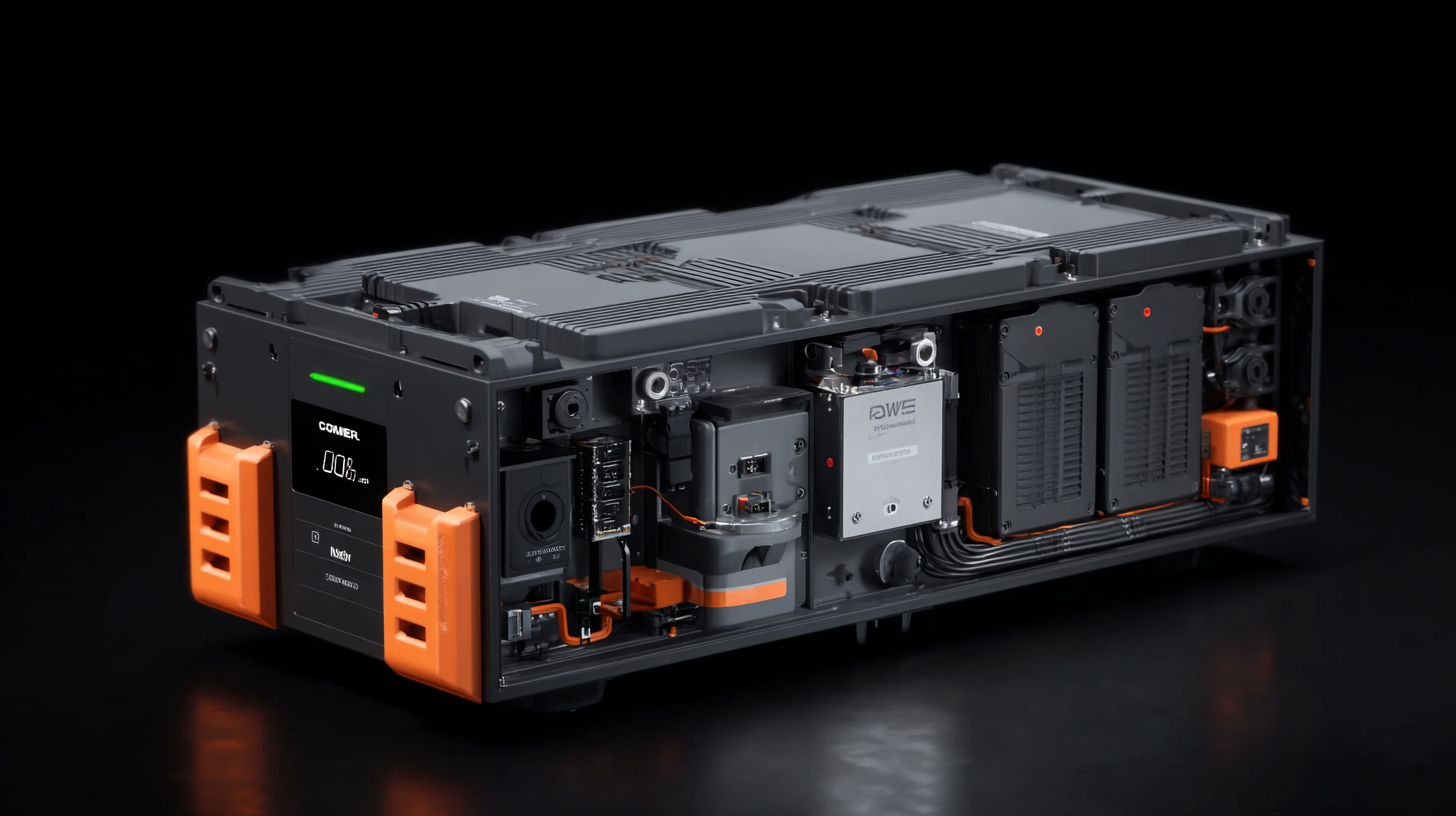In the rapidly evolving landscape of renewable energy and fuel cell technology, maximizing efficiency has become a critical focus for businesses aiming to sustain competitive advantages. According to a report by MarketsandMarkets, the global fuel cell market is projected to reach USD 29.9 billion by 2026, driven in large part by innovations from industry leaders like Plug Power. This company has established itself as a pioneer in hydrogen fuel cell systems, offering robust solutions that enhance operational efficiencies across various sectors, including logistics and transportation.
 With increasing pressure to reduce carbon footprints, the integration of Plug Power solutions can significantly lower operational costs while promoting sustainability. This ultimate guide will explore strategic approaches to fully leverage Plug Power's groundbreaking technologies, ensuring businesses not only thrive in performance but also contribute towards a greener future.
With increasing pressure to reduce carbon footprints, the integration of Plug Power solutions can significantly lower operational costs while promoting sustainability. This ultimate guide will explore strategic approaches to fully leverage Plug Power's groundbreaking technologies, ensuring businesses not only thrive in performance but also contribute towards a greener future.
Plug Power Solutions represent a cutting-edge approach to enhancing operational efficiency in various industries. According to a recent report by Grand View Research, the global hydrogen fuel cell market is expected to reach $21.4 billion by 2025, demonstrating a 22.5% compound annual growth rate (CAGR). This trend highlights the increasing recognition of Plug Power's technology as a viable alternative to traditional energy sources, particularly in logistics and material handling operations where efficiency is paramount.
Understanding the fundamentals of Plug Power Solutions can significantly impact an organization’s operational strategy. By leveraging hydrogen fuel cells, businesses can achieve quicker refueling times—often in under 15 minutes—compared to the standard battery charging cycles that can last hours. Moreover, the U.S. Department of Energy emphasizes that fuel cell systems can convert hydrogen into electricity with conversion efficiencies exceeding 60%, a stark contrast to traditional combustion engines that typically operate at around 20% efficiency. This dramatic increase in energy utilization not only reduces operational costs but also aligns with modern sustainability goals by minimizing greenhouse gas emissions.
In the quest for operational excellence, identifying key areas for improvement is essential, and Plug Power technology offers innovative solutions that can significantly enhance efficiency. By harnessing advanced hydrogen fuel cell systems, businesses can streamline their energy usage and reduce reliance on traditional power sources. This transition not only minimizes operational costs but also supports sustainability goals, making it a vital focus area for any forward-thinking enterprise.
Implementing Plug Power solutions allows organizations to pinpoint inefficiencies in their current processes. Real-time data analysis from these systems can reveal patterns and insights that highlight where energy consumption is highest or where downtime occurs most frequently. As a result, companies are empowered to make informed decisions that optimize performance. For instance, integrating Plug Power's renewable energy solutions can lead to improved logistics and operational workflows, ensuring that energy is used more effectively while reducing environmental impact. Emphasizing these improvements ultimately positions businesses to operate at peak efficiency and maintain a competitive edge in their respective industries.

Integrating Plug Power solutions into your operations can significantly enhance efficiency, but best practices are essential for a seamless transition. Start by conducting a thorough assessment of your current systems and workflows. Identify areas where hydrogen fuel cells can replace traditional power sources, leading to reduced downtime and lower operating costs. Engaging stakeholders early in the process is crucial, as their insights can provide valuable context to ensure a smooth integration.
Once you've mapped out your integration plan, focus on training your staff to handle the new technology effectively. Continuous education on the maintenance and operation of Plug Power systems will increase your team's confidence and competence. Additionally, leveraging data analytics can help you monitor performance in real-time, allowing for quick adjustments and ongoing optimization. By prioritizing these best practices, your organization can fully leverage the benefits of Plug Power solutions, driving long-term efficiency and sustainability in your operations.
| Best Practice | Description | Expected Efficiency Gain (%) | Implementation Timeframe |
|---|---|---|---|
| Routine Maintenance | Regular inspections and servicing of equipment to prevent failures. | 15 | Monthly |
| Energy Management System | Utilizing software to monitor energy consumption and optimize performance. | 20 | 3 Months |
| Staff Training | Educating employees on best practices for equipment usage and safety protocols. | 10 | 2 Weeks |
| Data Analytics | Analyzing operational data to identify inefficiencies and areas for improvement. | 25 | Ongoing |
| Integration of Renewable Energy | Deploying solar or wind energy systems to complement existing power solutions. | 30 | 6 Months |
 In today's competitive landscape, leveraging data analytics is essential for maximizing the efficiency of Plug Power Solutions. By utilizing real-time data, businesses can monitor and optimize their power performance, transforming raw information into actionable insights. This approach not only streamlines operations but also enhances decision-making processes, allowing organizations to anticipate issues before they escalate. Predictive maintenance, for instance, can significantly reduce downtime and maintenance costs, ensuring that systems remain operational and efficient.
In today's competitive landscape, leveraging data analytics is essential for maximizing the efficiency of Plug Power Solutions. By utilizing real-time data, businesses can monitor and optimize their power performance, transforming raw information into actionable insights. This approach not only streamlines operations but also enhances decision-making processes, allowing organizations to anticipate issues before they escalate. Predictive maintenance, for instance, can significantly reduce downtime and maintenance costs, ensuring that systems remain operational and efficient.
Moreover, implementing advanced data analytics tools can lead to improved overall performance metrics. Companies can analyze trends, identify patterns, and make informed adjustments to their operations. For example, IoT-enabled energy management systems can provide continuous monitoring of energy usage, optimizing consumption and storage in real time. By combining these insights with AI-driven analytics, firms can further enhance their marketing strategies and operational workflows, pushing the boundaries of productivity and efficiency in the process.
When utilizing Plug Power solutions, maintaining peak efficiency is crucial for optimal performance. Troubleshooting common issues can significantly enhance the longevity of your fuel cell systems. One of the primary concerns is ensuring consistent air supply. Insufficient airflow can lead to lower power output and diminished efficiency. Regularly check air filters and the ventilation system to prevent blockages and ensure that your systems operate smoothly.
Another frequent issue involves electrolyte levels in the fuel cells. Low electrolyte levels can hamper the reaction process, resulting in reduced energy production. It's essential to monitor and maintain the recommended electrolyte levels, promptly addressing any discrepancies. Additionally, regular inspection of connections and cables for corrosion or wear can prevent potential energy losses. By staying proactive in these areas, you can effectively troubleshoot problems before they escalate, ensuring your Plug Power solutions deliver maximum efficiency and reliability.
This bar chart illustrates the efficiency levels observed across different Plug Power solutions over a period of time, highlighting areas that may require troubleshooting to maintain optimal performance.





